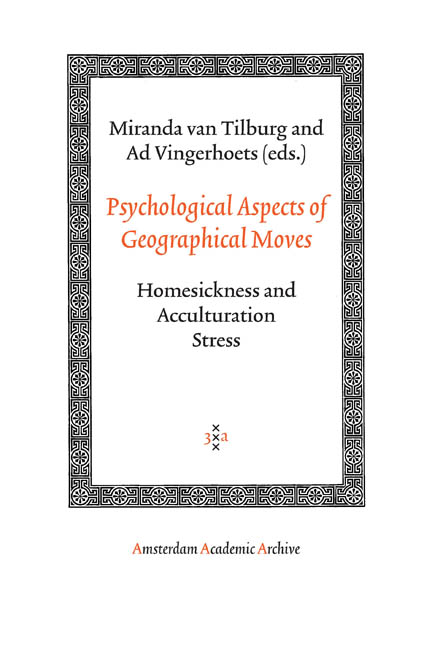Book contents
- Frontmatter
- Preface
- Contents
- Contributors
- 1 The Homesickness Concept: Questions and Doubts
- 2 Culture Shock, Homesickness, and Adaptation to a Foreign Culture
- 3 The Psychological Context of Homesickness
- 4 Geographical Moves and Psychological Adjustment
- 5 Homesickness and Acculturation Stress in the International Student
- 6 Psychological and Psychosocial Adjustment of Migrants: Families in a Changing Environment
- 7 Individual Differences in Acculturative Stress Reactions: Determinants of Homesickness and Psychosocial Maladjustment
- 8 The Cry for the Lost Placenta: Cultural Bereavement and Cultural Survival among Cambodians who Resettled, were Repatriated, or Stayed at Home
- 9 Children's Coping with Homesickness: Phenomenology and Intervention
- 10 Homesickness after Relocation during Early Adolescence
- 11 Personality, Temperament, and Homesickness
- 12 Homesickness, Personality and Personality Disorders: An Overview and Therapeutic Considerations
- 13 Health Issues in International Tourism: The Role of Health Behavior, Stress and Adaptation
- 14 Development of Psychopathology in International Tourists
- Miscellaneous Endmatter
Preface
Published online by Cambridge University Press: 23 January 2021
- Frontmatter
- Preface
- Contents
- Contributors
- 1 The Homesickness Concept: Questions and Doubts
- 2 Culture Shock, Homesickness, and Adaptation to a Foreign Culture
- 3 The Psychological Context of Homesickness
- 4 Geographical Moves and Psychological Adjustment
- 5 Homesickness and Acculturation Stress in the International Student
- 6 Psychological and Psychosocial Adjustment of Migrants: Families in a Changing Environment
- 7 Individual Differences in Acculturative Stress Reactions: Determinants of Homesickness and Psychosocial Maladjustment
- 8 The Cry for the Lost Placenta: Cultural Bereavement and Cultural Survival among Cambodians who Resettled, were Repatriated, or Stayed at Home
- 9 Children's Coping with Homesickness: Phenomenology and Intervention
- 10 Homesickness after Relocation during Early Adolescence
- 11 Personality, Temperament, and Homesickness
- 12 Homesickness, Personality and Personality Disorders: An Overview and Therapeutic Considerations
- 13 Health Issues in International Tourism: The Role of Health Behavior, Stress and Adaptation
- 14 Development of Psychopathology in International Tourists
- Miscellaneous Endmatter
Summary
The idea for this book grew out of a symposium on ‘Homesickness and Acculturation Stress’ held at the 13th World Congress of the International College of Psychosomatic Medicine in Jerusalem, Israel, in September 1995. The chapters of this book are based upon the papers and discussions of this symposium. Some of the authors were unable to attend the symposium, but contributed to the book to help us give a more complete picture of current research and thinking about homesickness and acculturation stress.
When we began our research on homesickness in 1991, we were surprised how little was known and written about this topic in the scientific literature. As our research developed and we tried to publish some of our results, we found – particularly in the United States – that research on homesickness was met with much skepticism. When talking about homesickness at conferences, many colleagues did not take our research, and even the topic, seriously. In the same vein, journal editors and reviewers gave evidence of many misconceptions. Many reviewers, although generally positive about our papers, remarked that they really saw no need to publish anything on this topic. One editor even returned a manuscript on adult homesickness, apparently unread and unreviewed, with the suggestion to send it to a journal that focuses on children.
At the same time, our research taught us that the magnitude of the problem was much bigger than expected. Among Dutch military conscripts, homesickness was the main reason for seeking psychiatric help. An announcement in a women's magazine yielded a response from over 300 hopeless women who felt themselves seriously incapacitated by their homesickness. They suffered from a high degree of homesickness, which dramatically affected their way of living and led to negative self-perceptions. Many of these women saw us as their last and only hope to ‘cure’ them of their homesickness, apparently not aware that we also knew very little about what they were precisely suffering from and how it impacted on their lives. This ignorance prevented us from offering them any real solution.
These experiences convinced us that it was important to combine research efforts on homesickness and related concepts, not only in the Netherlands, but internationally.
- Type
- Chapter
- Information
- Psychological Aspects of Geographical MovesHomesickness and Acculturation Stress, pp. v - viiiPublisher: Amsterdam University PressPrint publication year: 2006



